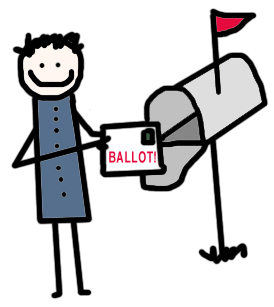Reed: Thumb’s up for all-mail voting
 Secretary Reed is a big fan of the state’s embrace of vote-by-mail – and is urging Congress to help voters in other states have the same option.
Secretary Reed is a big fan of the state’s embrace of vote-by-mail – and is urging Congress to help voters in other states have the same option.
Reed, now in his 10th year as Washington’s chief elections officer, has been impressed with how well-received this reform has been, implemented over time and without a mandate from Olympia. In recent testimony prepared for the U.S. Senate Committee on Rules and Administration, Reed endorsed legislation by both of Oregon’s senators and Washington Sen. Maria Cantwell to make it easier for other states and voters to adopt vote-by-mail if they wish.
Oregon Secretary of State Kate Brown appeared before the panel’s work session in Washington, D.C. The Universal Right to Vote by Mail bill would eliminate restrictions in 28 states and territories for use of vote-by-mail by any registered voter who prefers this method.
Oregon has switched entirely to vote-by-mail, courtesy of a citizen initiative passed in 1998. California is about 40 percent VBM and Washington is mostly vote by mail. As Reed wrote in his statement to Congress, it was no overnight decision – and voters really drove the bus.
More than 35 years ago, the Washington Legislature authorized all eligible voters to request a no-excuse-needed absentee ballot on a one-shot basis. In 1993, voters were allowed to sign up for permanent vote-by-mail status, meaning they could get a ballot in the mail for every election. That same year, counties were authorized to do their nonpartisan elections by mail.
By 2004, over 68 percent of us were voting by mail, through our own choice. In 2005, the Legislature passed a local-control law that said counties could decide whether to switch entirely to mail ballots. Within two years, virtually all had done so. Today, only Pierce County retains some polling places, although most of their voters, too, prefer mail voting.
Reed told the Senate:
“It is a huge hit with our voters, increases participation , reduces costs and provides time-pressed voters with more than two weeks to consider their ballot in the comfort and privacy of their own homes.”